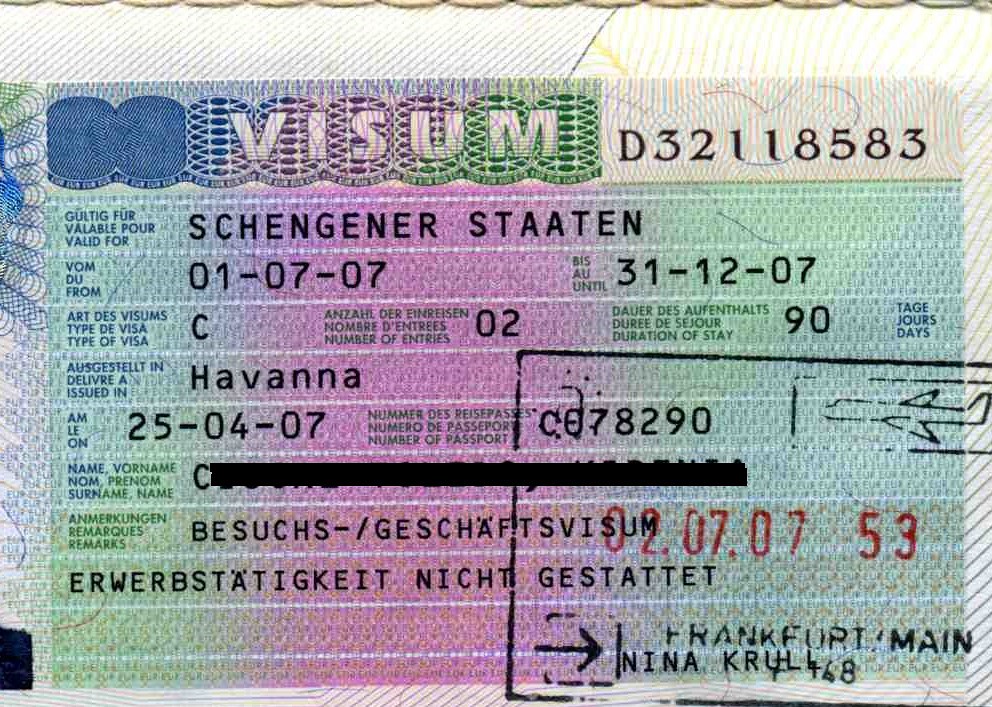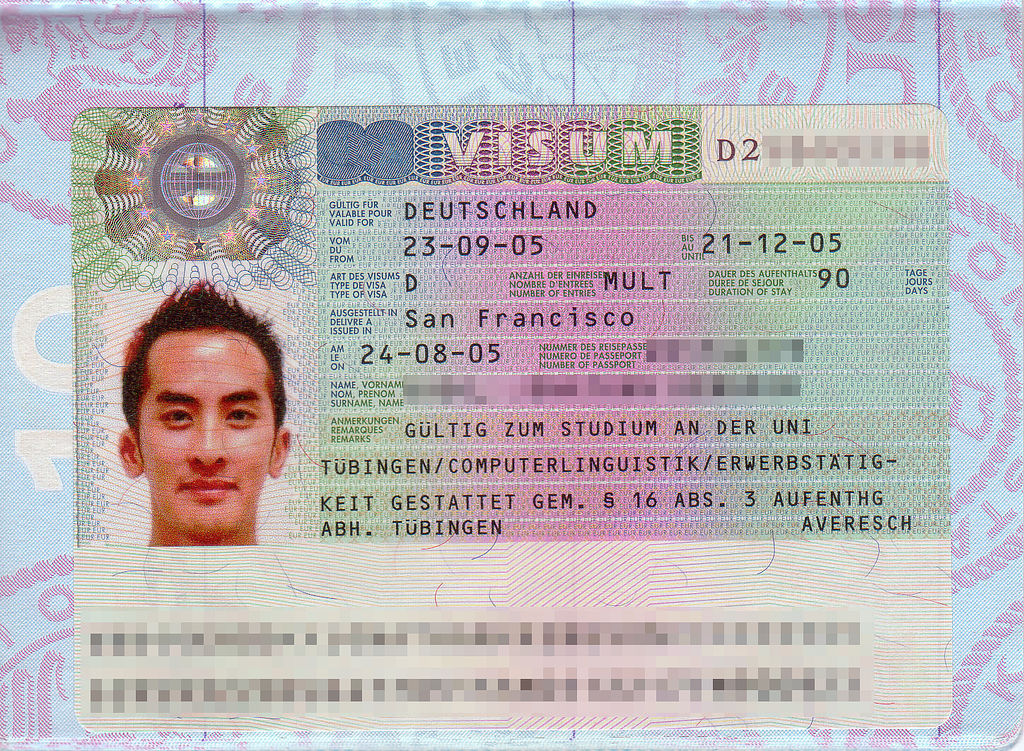Can I temporarily work in my company's office in the Schengen area on a type C Schengen visa working in the UK on a Tier 2 visa?
score:1
Schengen visas (Visa Category C) can be issued for short-term stays of up to 90 days in countries in the Schengen area, e.g. for visits, tourism or business purposes, or medical treatment.
The consulates of the signatory countries of the Schengen Agreement are responsible for issuing Schengen visas....
Economic activity
As a rule, you are not permitted to work with a Schengen visa.Otherwise, your visa states whether and to what extent you are permitted to work.
If the C-Visa explicitly states that work or Business is allowed in the Remarks area then you can, otherwise you cannot do so.
Application for Schengen Visa (Link to Application Form Pdf for Germany)
- Hauptzweck(e) der Reise / Main purpose(s) of the journey:
- Geschäftsreise / Business
- Hauptzweck(e) der Reise / Main purpose(s) of the journey:
When checking Geschäftsreise / Business then
- GESCHÄFTSVISUM will be added to the REMARKS field of the C-Visa (as seen in the second Image below).
Multiple purposes can be selected, each one being added to REMARKS.
Each country does this differently:
Annex 22 1 National entries in the "comments" section of the visa sticker
For the sample Business (not all countries have this category)
- BENELUX (Belgium, Netherlands and Luxembourg)
- BNL 13 : visa issued for "business purposes".
- CZECH REPUBLIC
- C/VF/01/-/--; multiple-entry visa for up to 90 days – commercial
- Hungry
- Üzleti / Business**
- Italy
- "AFFARI" (business)
- Latvia
- "BUSINESS"
- Malta
- MT12 - Business purposes
- Poland
- 04 - Business purposes
- Slovenia
- poslovno (business)
- Slovakia
- obchodná cesta (business trip)
- Spain
- TRABAJO (work)
- Sweden
- "Affärsanledning": Business
- Switzerland
- Business
Standard C-Visa issued for the whole Schengen Area

This one says Visitor Visa - Working not permitted
- this is the new sticker type visa
A Business C-Visa must be explicitly applied for and the application must include
- Company covering letter with entire travel plan (itineary)
- Invitation letter from the business partner

This one says Visiting-/Business Visa - Working not permitted
What you will need is a short term D-Visa that allows you
- to work (training is considered work) for a specific period
- at a specific firm in a specific country

This one says Student Visa for Uni X - Working permitted according to bla bla bla...
- notice also that it is only valid for a specific country and a date from/to
- valid for other Schengen Countries vists where the 90/180 days rule applies
A D-Visa is a national visa for a specific purpose and should not conflict with an existing long term C-Visa that serves a completely different purpose.
Upvote:0
Other answers give you the technical details about what visa you need to work in Germany, but since your write "as an employee I may be allowed to work there for a week or two for the experience, and to get to know the team there" let me explain how this normally happens.
The definition of "work" for visa purposes may be different from the common one. Things you are allowed to do on a normal business visa include:
- Learning how colleagues in other countries do things
- Consulting with colleagues in other countries about how you might do things better
- Planning for work you might be doing
- Reviewing work you have done
- Having meetings to discuss past or future work, including getting to know colleagues in other countries
You might think of these as "work" , but Schengen and other countries normal consider work to be only "productive work". For example, if you were a software developer then time spent discussing architecture or reviewing customer feedback doesn't count as work. And there are some grey areas - for example if you need to test whether a particular architecture is feasible, you might write some code to test it. And it's far from unknown for visitors to do occasional bits of their "normal work" in between the meetings, and nobody will object to that.
It would be normal that "going to to Germany for the experience" could easily covered by the above legal activities. If your primary purpose is consultation, discussion and training, and your visit is only for a few weeks, then you should be fine. I and my colleagues have done this many times perfectly legally over the last 20 years.
Your company should be able to give you good advice. And it is important, when talking to immigration, to describe what you are doing as "meetings learning and discussion" and not "work".
More post
- 📝 From Gatwick airport to central London by bus
- 📝 Am I eligible for a Schengen visa if my passport will expire in 3 months?
- 📝 May I drive an Indian-registered car in Nepal?
- 📝 Australian Transit Visa - what determines the 72 hours - Immigration(entry to exit) or Landing to Takeoff?
- 📝 Extra 50 lbs (23kg) bag with Air China
- 📝 Schengen visa for two stopovers in Germany
- 📝 Is my social security number from a previous temporary work visa still valid?
- 📝 My passport cover is separated can I travel?
- 📝 Can I sleep in the landside section of Austin-Bergstrom airport?
- 📝 Is it possible to directly go to the transit area with self printed boarding pass while travelling with two different airlines?
- 📝 Is there poker in southwest Europe?
- 📝 How to get off a London bus when sitting on the top deck?
- 📝 When do campaign signs go up for US Presidential Elections?
- 📝 Should I buy the Suica & N'EX package to go from Narita to Tokyo?
- 📝 Is there a regular ferry between Sicily and Sardinia? (first hand experience)
- 📝 USA tourist visa application for a student
- 📝 Spending few hours more than the “duration of stay”, that mentioned in the Schengen visa can make any problem?
- 📝 Using 2 Passports
- 📝 Good and cheap hotels in Hong Kong
- 📝 Daughter flying alone from Athens Greece to Newark to Chicago - Need info/advice
- 📝 United Airlines online check-in for international departures from the US
- 📝 How soon can I reapply for a short-stay Schengen Visa?
- 📝 storing medications in checked baggage
- 📝 Where are the main clothes shopping areas in London?
- 📝 Turkey eVisa against Schengen visa
- 📝 Obtaining a covid test in Czech Republic
- 📝 What vessel did I photograph? How would I tell?
- 📝 LA Universal Studios in Christmas
- 📝 Valid Vietnam tourist visa in old passport
- 📝 Does a Filipino flying from Vietnam to Brazil need a visa or transit visa to layover in Istanbul or Doha Qatar?
Source: stackoverflow.com
Search Posts
Related post
- 📝 Can I temporarily work in my company's office in the Schengen area on a type C Schengen visa working in the UK on a Tier 2 visa?
- 📝 Can I gain entry into the Schengen area through Spain if my visa is a Type D Italian visa?
- 📝 Can you exit the airport when transiting the Schengen area on a single-entry Schengen visa?
- 📝 Schengen area 90 days limit: Can I leave on the 91st day?
- 📝 Traveling in Schengen area before going to the country that my type D visa is for
- 📝 Can a dual citizen with a Schengen residence permit enter the Schengen area on their second passport?
- 📝 Can I travel within the Schengen area while my Italian residency card is being renewed?
- 📝 Can I stay in Schengen area after my visa expires if I enter while the visa is valid?
- 📝 Can a dual US-Bulgarian citizen travel to the Schengen area with a passport that expires in 3 months?
- 📝 Can I leave the Schengen Area (and come back) while my non-eea spouse resident card application is being processed?
- 📝 Can you transit through the Schengen Area without a visa when traveling on separate tickets?
- 📝 Can someone change his/her original purpose in the Schengen area during the travel?
- 📝 Can family of EU Blue Card holder travel freely in the Schengen Area with a German Aufenthaltstitel?
- 📝 Can I go to the Schengen area for only one day and then to Turkey the next day?
- 📝 Can I travel through the Schengen area if my passport expires in less than 6 months?
- 📝 I want to travel to the Schengen area for business and take my family with me. Can we apply for a visa together?
- 📝 Is there a Schengen area database that can see past travel in the Schengen area?
- 📝 Can a non-EU national enter the Schengen area via Croatia during the COVID pandemic travel restrictions?
- 📝 Can I exit the Schengen area from a country that has previously rejected my visa application?
- 📝 How can I travel to the Schengen area without applying for a separate visa for every trip?
- 📝 I’m an Australian resident with a UK residence permit. Can I stay in the Schengen area for more than 90 days?
- 📝 Can I enter the Schengen area after previously staying there for 89 days in the past 6 months?
- 📝 I am a holder of a UK Spouse Visa. Can I stay in the Schengen Area for longer than three months on the basis of my Spouse Visa?
- 📝 Is it possible to enter the Schengen area as a tourist while a German work visa request is in process?
- 📝 Can someone travel from outside the Schengen area into the Schengen area just as a transit passenger without holding any Schengen visa?
- 📝 Can I enter France from outside the Schengen area with a valid permesso di soggiorno?
- 📝 I work in the UK on a short-term visa and my wife/daughter are in the UK on a tourist visa. Can we apply for a Schengen visa together in the UK?
- 📝 Can I stay in Schengen area after my visa still valid but breach the condition
- 📝 Can I travel through the Schengen Zone on a type D student visa (for Spain) if I have already lived in the country of the vissa for more then 90 days?
- 📝 Can a US Green Card holder travel to the Schengen area without a visa?

